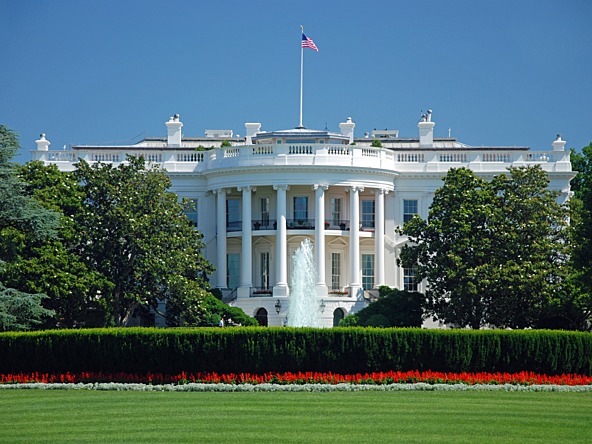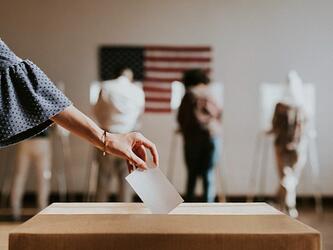Trump wins US election, with polls understating support for Republican nominee

At the time of writing, Trump had won the election with 277 electoral votes and 46 out of 51 states called.
As the votes are still being counted and final vote share has not yet been calculated, it is not fully clear exactly how the polling companies performed or whether there has been a systematic miscalculation – that could take months to ascertain.
Most polls had predicted a very tight race, with the Guardian’s polling average over a 10-day period putting Democratic nominee Kamala Harris one point ahead.
At the time of writing, Trump had 51% of the vote and was projected to have won the key swing states of North Carolina, Georgia, Pennsylvania and Wisconsin.
Polls systematically underestimated Trump’s vote in the 2016 and 2020 elections, particularly in swing states. A post-2016 analysis by pollster organisation AAPOR found there had been a late swing towards Trump, and that polling companies had over-represented graduates in samples.
Yesterday, ( 5th November), Five Thirty Eight founder Nate Silver wrote in his Silver Bulletin blog that he had conducted 80,000 simulations through its election model, with Harris emerging as the winner in 40,012 – 50% – and the remainder split between Trump ( 39,718 ) and no majority (a 269-269 tie). Silver said: “The race is literally closer than a coin flip: empirically, heads wins 50.5% of the time, more than Harris’ 50.015%.”
Have the pollsters got it wrong? Professor John Curtice said: “No more wrong than is the average for the performance of the polls. If you take the estimate of the national vote share, on average, most of the aggregators said Harris was a point ahead. In the end, it looks as though Trump might be four points or so ahead, with counting still going on, so that’s within the margin of error because it’s five points for the lead.
“So yes, they underestimated Trump and they did the same thing in 2016 and 2020 but I don't think it will be as bad as 2020. But if you read any aggregating website yesterday they all said ‘it’s 50/50 and because it’s possible that Trump might get all of the swing states and it could be that Harris could get all of the swing states, the outcome in terms of the electoral college could still look quite comfortable.'
“Looking at the individual swing states, there is a small underestimation of the Trump support. It’s not enormous, and it was something that anyone and everyone who was seriously commenting on the polls said could happen.”
Debrah Harding, managing director, MRS, said: “With the final states’ results coming through, pollsters on both sides of the pond are already dissecting the numbers and assessing the lessons that need to be learned. This was always going to be a tricky election to call, particularly given the turbulent campaign trail for both parties.
“As the sector reflects on a historic election year, we need to keep looking at what we can do better including making sure polls are representative and methodologies are transparent.”
I spoke with Ben Page, chief executive of Ipsos, who was in the US during the election. He said: “We won’t know the actual percentage vote share until the weekend at the earliest, so how far off the polls were is not yet clear – but they obviously should have had Trump ahead.”
Page had told the company’s third quarter results earning call in October that in his personal view, Trump was likely to win, due to his lead on the economy, which has never dropped below six points. “It was the number one issue for voters,” Page said.
Page said: "The bias in who responds to polls was clear in 2016 and 2020 in the USA – this time the US team tried to correct for it by looking at refusals to declare voting choice and ‘don’t knows’ and assigning some of those who were very anti-immigration and pro-gun as conservative/Trump voters but they probably did not go far enough. We will also need to examine how turnout models are applied – as with the Brexit vote, these are crucial in all elections.”
Self-identified independent voters accounted for a larger share of voters in the election than Democrats and were tied with Republicans, according to exit polling data from Edison Research.
Martin Boon, co-founder at DeltaPoll, said: “It’s too soon to be able to say whether or not this is a technical polling miss, it might just be within margins of error and there’s some comfort there. However, what is certainly going to be true is that this is yet another example of polls understating the party or candidate of the Right, and the third consecutive such experience for the American polling industry.
“It is my contention that there is something systematic going on here that cross-cuts time and nations. There’s too much evidence now to ignore it or else deal with it with soft touch interventions, and pollsters need to get a grip on it.”

We hope you enjoyed this article.
Research Live is published by MRS.
The Market Research Society (MRS) exists to promote and protect the research sector, showcasing how research delivers impact for businesses and government.
Members of MRS enjoy many benefits including tailoured policy guidance, discounts on training and conferences, and access to member-only content.
For example, there's an archive of winning case studies from over a decade of MRS Awards.
Find out more about the benefits of joining MRS here.













0 Comments